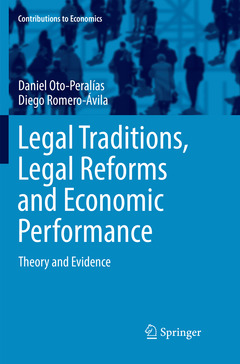Legal Traditions, Legal Reforms and Economic Performance, Softcover reprint of the original 1st ed. 2017 Theory and Evidence Contributions to Economics Series

1. Introduction
2. Revisiting the Legal Origins Hypothesis: A Brief Review of the Literature
2.1 The Legal Origins View
2.2. Arguments Based on Colonialism and the Distribution of Legal Traditions around
the World
2.3. Arguments based on Political Economy
2.4. Arguments based on Measurement and Recoding of Legal Data
2.5 Recapitulation
3. Data Description
3.1 Legal and Regulatory Indicators
3.2 Economic and Financial Outcomes
3.3 Description of Doing Business Reforms since 20064. Literature Review on the Effect of the Ease of Doing Business on Economic and
Financial Outcomes
4.1 Research on Protecting Minority Investors4.2 Research on Getting Credit and Information Disclosure
4.3 Research on Contract Enforcement
4.4 Research on Resolving Insolvency
4.5 Research on Starting a Business
4.6 Research
on Registering a Property and Protecting Property Rights4.7 Research on Dealing with Construction Permits
4.8 Research on Paying Taxes
4.9 Research on Trading across Borders5. Legal Change within Legal Traditions and Convergence
5.1. Has There Been Legal Change over the period 2006-2014?
5.2. Have Legal Reforms Reduced the Differences in Legal Rules/regulations across
Legal Traditions?
5.3. Has There Been Convergence in Legal and Regulatory Standards among Legal
Traditions over the Period 2006-2014?
5.4. More on Convergence: Robustness Checks
6. Legal Rules Variation and Countries’ Economic and Financial Performance6.1. The Effect of Legal Rules and Regulations on Economic and Financial Performance
6.2. Distinguishing the Circumstances under Which the Effect Takes Place
6.2.1 Differentiating by Level of Development
6.2.2 Differentiating by Institution
al Quality6.2.3 Differentiating by Legal Tradition
6.2.4 Interacting Legal and Regulatory Indicators with the Level of Development
6.3. Graphical Analysis of the Relationship between Legal Change and Financial and
Economic Development
7. Sensitivity Analyses on the Effect of Legal Rules Variation on Economic and
Financial Performance
7.1. Using Alternative Legal Indicators
7.2. Using Alternative Panel Estimations: Difference and System GMM Estimators
7.3. General Discussion
8. The Effectiveness of Legal Reforms and the Gap between Law on the Books and
the Reality on the Ground
8.1. Explanatory Factors for the Effectiveness of Legal Reforms: A PreliminaryAnalysis
8.2. Gap between Law on the Books and the Reality on the Ground
8.3. Gap between Law on the Books and Law in Action
8.4 Summary of Results
9. Conclusions
Diego Romero-Ávila is Associate Profes
Describes the impact of legal regulations on economic and financial outcomes
Analyzes the relationship between legislation and the real economy
Based on real case studies from the World Bank's Doing Business Project 2015
Date de parution : 08-2018
Ouvrage de 252 p.
15.5x23.5 cm
Date de parution : 10-2017
Ouvrage de 252 p.
15.5x23.5 cm



